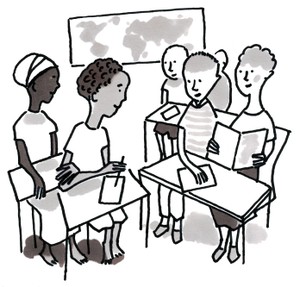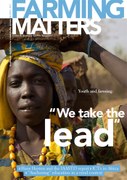Edukans is a Dutch non-governmental organisation which aims to facilitate access to education, and improve its quality. Miet Chielens, one of its Programme Officers, explains that the organisation “aspires to give disadvantaged and marginalised children in developing countries a chance to build a better future for themselves and their society”.

Miet Chielens, one of its Programme Officers, explains that the organisation “aspires to give disadvantaged and marginalised children in developing countries a chance to build a better future for themselves and their society”. What distinguishes Edukans from other NGOs is its exclusive focus on education, which it sees as “the most efficient investment for international co-operation, because when individuals get the opportunity to learn basic life and literacy skills, economies grow faster and poverty rates decline”.
Many NGOs share the aim of contributing to the development of knowledge and skills in developing countries. But Edukans’ objective is twofold: besides promoting the education of marginalised children, it also aims to improve the Dutch education system. This twofold objective is exemplified by the World Teacher Project (WTP), a two-year pilot project that was launched by Edukans in 2009 and which, thanks to its positive results, is continuing during the period 2011-2013.
In Ms Chielens’ words, the WTP “links Dutch teachers with teachers in the South so as to improve education in a co-operative way”. One major problem with the educational system in developing countries is that “although a significant number of the poorest children are going to school, too few are really learning something”. It is therefore not only necessary to make sure that every child goes to school, but also to guarantee the quality of the education they receive.
“Of course, it is very difficult to give a precise value to ‘quality’, as it always depends on the context”, she says. “The quality of education has different meanings for different people”. Not all subjects are taught everywhere, nor are they taught in the same way in different countries and regions, so an objective evaluation of what pupils and students learn is not always possible – especially from the perspective of an outside observer. Edukans’ perspective on teaching and learning assumes that “individuals develop themselves on the basis of their own identities and cultures, and through the use of their own talent and potential”.
Edukans is based in Amersfoort, the Netherlands. At the moment it is collaborating with schools and organisations in six countries: Ethiopia, India, Kenya, Malawi, Peru and Uganda.
More information about the organisation and the World Teacher Project can be found in Dutch, English and Spanish on their website http://www.edukans.nl/english. Readers are also invited to write to Miet Chielens (miet.chielens@edukans.nl) or to the programme co-ordinator, Mildred Klarenbeek (m.klarenbeek@edukans.nl).
A bottom-up approach is essential, and this is one of the main strategies of the project. “The general purpose of the WTP is to study the local education system and to co-operate with local teachers, with a focus on quality issues”, and therefore paying attention to issues such as child-centred learning, active learning, or multiclass teaching. In short, this is carried out in faceto- face meetings between Dutch and local teachers.
These meetings are mutually beneficial: teachers in countries like Peru or Malawi get ideas that help them develop their teaching abilities, while Dutch teachers acquire expertise. An additional outcome is seen in the chances that teachers in the Netherlands get to improve their classes and activities, helping Dutch pupils and students develop competencies such as dealing with differences, cultural empathy, social initiative, and flexibility. As Miet Chielens puts it, these are indispensable skills for developing a “global citizenship”.
Text: Nicola Piras

